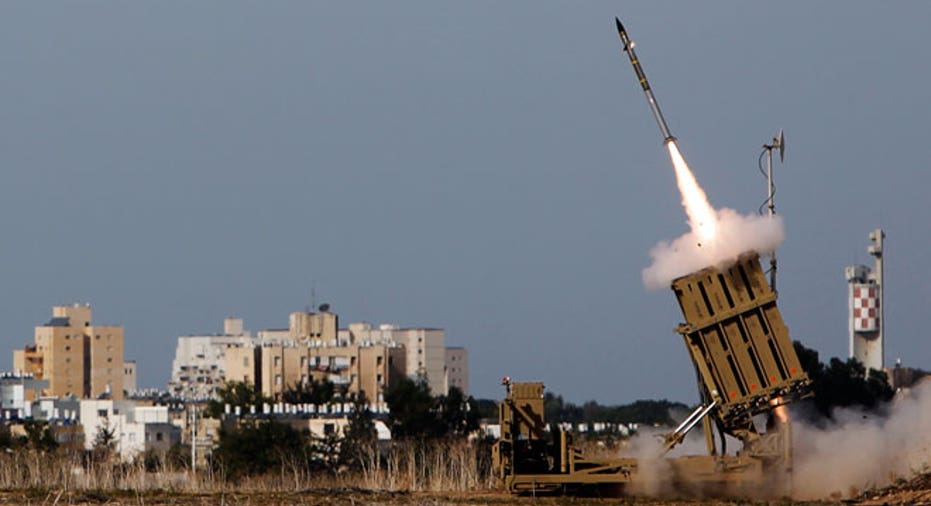Mideast Jitters Resurface on Wall Street as Gaza Conflict Escalates

U.S. investors ramping back on their exposure to risk have no shortage of troubling storylines to ponder as the scary fiscal cliff continues to creep closer, eurozone jitters re-emerge and the domestic economy remains largely stagnant.
Not that they needed it, but market participants have a new concern to add to their long list of worries: a full-scale regional conflict in the Middle East.
Nervousness about that boiling region resurfaced this week after Israel and Hamas lobbed missiles at each other in the Gaza Strip, raising the specter of a war or wider conflict that could cause more loss of life and an economically-painful jump in crude oil prices.
“It looks bad and it is bad -- and the market knows it,” said Peter Kenny, managing director at Knight Capital Group (NYSE:KCG). “It is just one more very important narrative for risk aversion in the market.”
Hostilities in the Middle East began fighting for Wall Street’s attention on Wednesday after an Israeli airstrike in Gaza killed Ahmed Jabari, the head of the military wing of Iran-funded Hamas.
In response, Hamas has launched a slew of missiles into Israel, including 66 on Thursday alone, excluding ones that were intercepted or never made it across the border.
Eyes on Egypt
Now some worry the next step could be an all-out ground offensive by Israel into Gaza to destroy remaining missile sites. Perhaps in preparation for a wider operation, Israel sealed off main roads around Gaza on Friday and is reportedly considering increasing its reservist call-up to 75,000.
“This could be Israel’s Clint Eastwood ‘make my day moment,’” said KT McFarland, a FOX News national security analyst.
Hostilities in Gaza are not exactly new, but they are occurring with the backdrop of increased rhetoric between Israel and Iran and in the aftermath of the violent Arab Spring that ushered out the pro-Israeli Mubarak regime in Egypt.
“In isolation, it’s not a conflict that’s new,” said Nicholas Colas, chief market strategist at ConvergEx. “What concerns people is there are so many other conflicts in the Middle East. The whole region is in such a state of flux that people worry it’s the straw that breaks the camel’s back.”
With Mubarak ousted and new Egyptian Prime Minister Hesham Kandil signaling support for Hamas with a visit to Gaza City on Friday, there are concerns that Egypt will scuttle its three-decade-old peace agreement with Israel.
McFarland said she sees a 40% chance of an eventual conflict pitting Israel against Egypt.
“There is this growing sense there are no guideposts for stability in the region going forward,” said Kenny.
Energy Markets Creep Higher
From an economic standpoint, the obvious place where the growing hostilities in the Middle East may show up is in the energy market.
So far the response to the headlines in the region has been less than alarmist. Brent and West Texas Intermediate crude oil have climbed roughly 1% each in the past three sessions, with U.S. crude landing at $86.67 on Friday.
“You’ve had a week where you’ve had rockets being lobbed back and forth in the Middle East, an escalation of the rhetoric and the actual violence and yet the [energy] market is not impressed,” said Tom Kloza, chief oil analyst at the Oil Price Information Service.
Kloza said had it not been for the “underlying pessimism” that occurs in the energy market at this time of the year, crude oil would have spiked at least $5.
Higher oil prices could trickle down into the already-slow economy, impacting consumer spending, transportation and materials costs.
“Every investor is keenly aware that as you get closer to $100 a barrel, that’s the tipping point between expansion and contraction in the U.S.,” said Colas.
McFarland said not enough attention is being paid to the threat that a wider regional war could impact the Suez Canal, a key trade route between Europe and South Asia.
“It’s very easy to mine the Suez Canal. That would be a significant economic crisis,” said McFarland.
No Shortage of Concerns
On top of worrying about the Suez Canal and a Mideast-fueled jump in oil prices, Wall Street has been consumed by developments surrounding the fiscal cliff, the $600 billion batch of spending cuts and tax increases set to take effect at year end.
Recent data also showed an unexpected surge in weekly jobless claims, likely driven by the aftermath of Hurricane Sandy and the still-weak labor market.
Plus, Europe is vying for investors’ attention as the major markets in Germany and France retreated more than 2% this week amid concerns about the future of Greece.
In response, the Dow Jones Industrial Average slumped 273 points through the first four trading days this week, leaving the benchmark index in territory unseen since late June.
“Two weeks ago we were all focused on Obama versus Romney. Now it’s like we have 17 things we have to worry about,” said Colas.



















